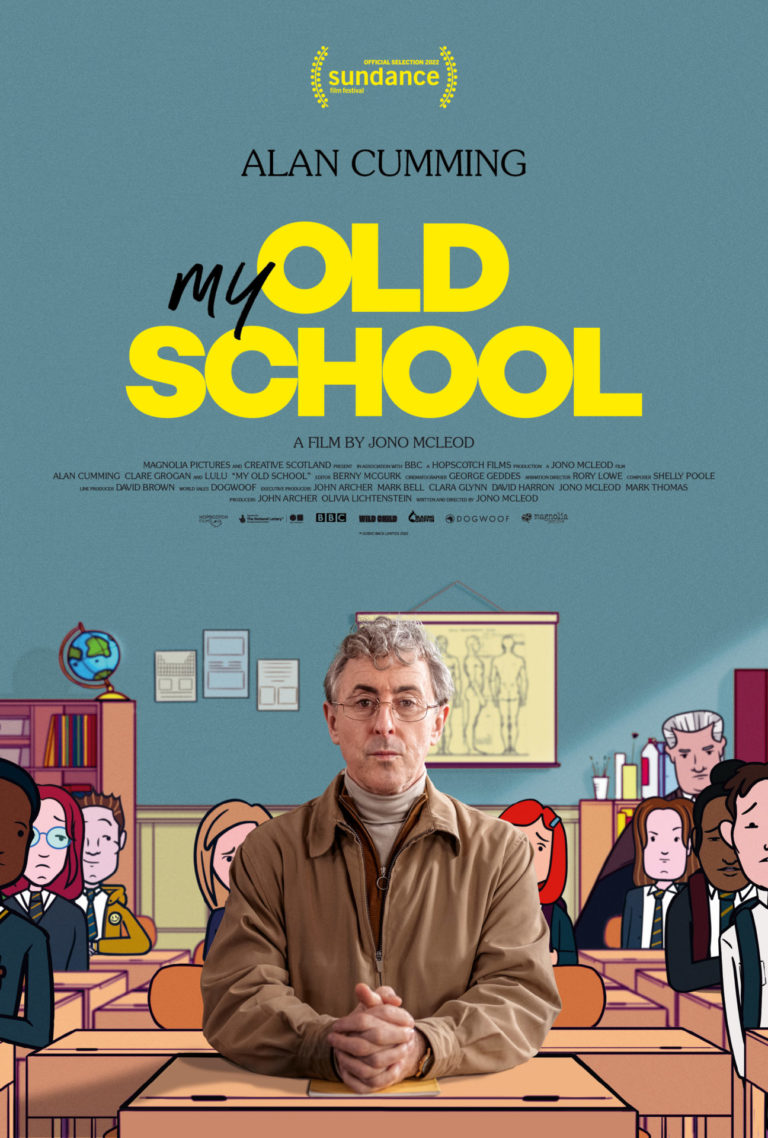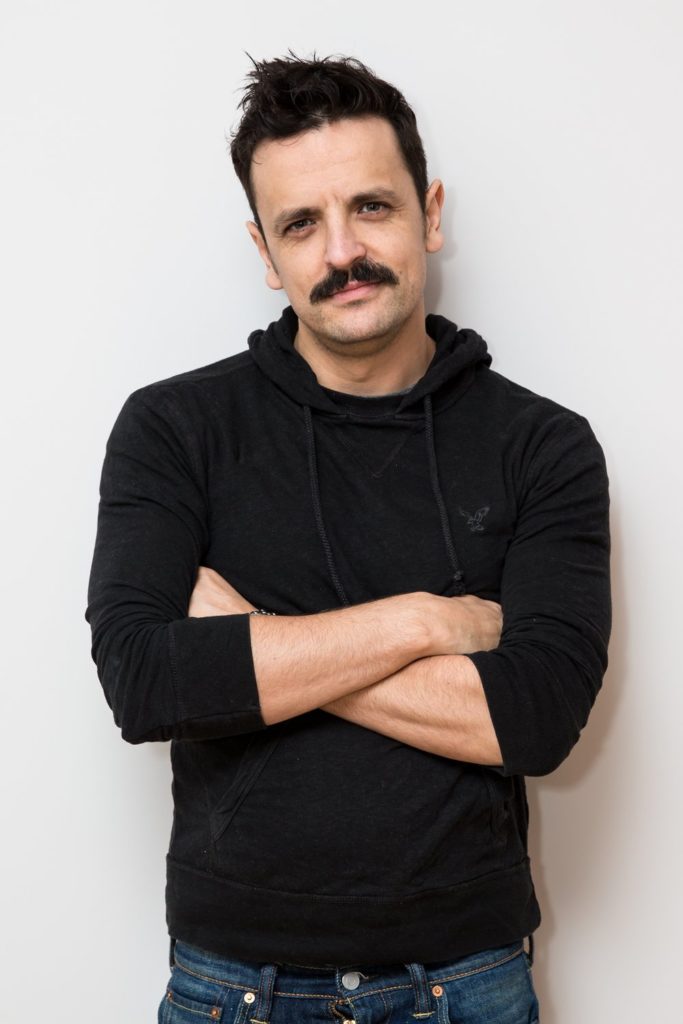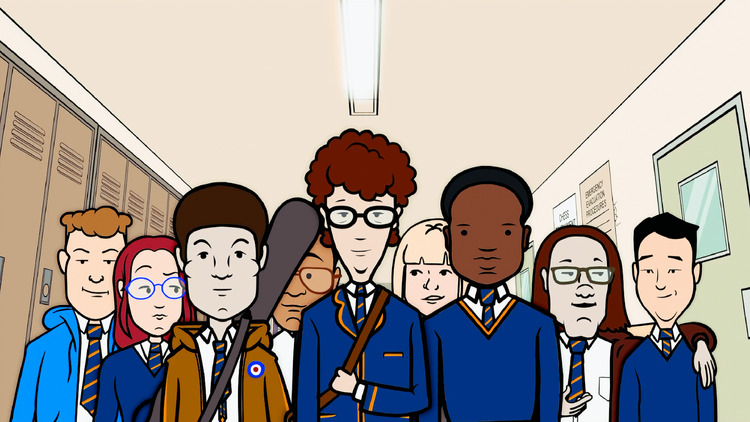
Synopsis : In 1993, 16-year-old Brandon Lee enrolled at Bearsden Academy, a secondary school in a well-to-do suburb of Glasgow, Scotland. What followed over the next two years would become the stuff of legend. Brandon had been privately tutored in Canada while he accompanied his mother, an opera diva, on tour before her tragic death. The preternaturally bright student surprised teachers by blazing toward his goal of entering medical school, displaying a wealth of knowledge beyond his years. Brandon found friends despite his initial awkwardness, taking bullied students under his wing, introducing classmates to seminal retro bands, and even starring in the school’s production of South Pacific. But then his unbelievable secret was revealed. Filmmaker Jono McLeod returns to his old school for a nostalgic look at the strange but true story of his former classmate, Brandon Lee. Utilizing playful, period-specific animation, a pitch-perfect soundtrack, the memories of students and teachers, and the talents of Alan Cumming to bring the tale to life, MY OLD SCHOOL offers more than one surprise along the way.

Exclusive Interview with Director Jono McLeod
Q: This story happened in 1993. What took so long to make a film out of it?
JM: Yeah, so that’s why I made it. Myself and my classmates have just been sitting waiting for this film to appear. When it never appeared, it felt like all eyes turned to me because I was the only classmate who grew up to be a filmmaker. If anyone was going to get it done, and tell it in this way, then it had to be me.
We were aware that people were still sniffing around, and aware that others were trying to tell this story in different forms. We were the first through the gate, even though it’s been 25 years. But there was a general feeling among my classmates that if it wasn’t us telling the story, it was going to be told in a very different way. It might be sinister, it might be Brandon’s version of events, and if we wanted to tell this our way, then it was down to us to do it. So that’s what we’ve done.
Q: You hired Alan Cumming, so how did you decide to tackle this as a documentary instead of a feature film?
JM: I wanted to try and pin down something closer to the truth than perhaps we would necessarily have done in a narrative version. In a narrative version, there would be more pressure on me to tie the story up in a bow at the end, and I don’t do that in this film.
I am aware that I’m probably antagonizing some people because I don’t [do that]. I don’t make everything make sense at the end. I wanted for people to leave discussing it and trying to figure out their own version, their own take on it. When you’re dealing with as many lies as this, there is no definitive truth.
Q: Brandon was your former classmate, so how did you decide to begin the story? This film doesn’t have a normal structure at all. Can you talk about all this: animation, classmate interviews, all these elements?
JM: It started with two key people. The first was Brandon himself, who agreed to be interviewed but wouldn’t be on camera. The second key person — who I knew I could make the film when I had them on board — was my classmate Nicola, who is the girl who goes on vacation with him and is in the school musical with him. Once I had those two on board, I knew that I was off and running and could tell the story in some form.
That got me going, and I liken the making of this film to finding my way out of a maze. It was about being presented with obstacles and trying to find a way around them. Brandon sets this challenge when he says, “I will do this interview. If you can find a way to make your film with only that, then you’re welcome to.”
I was aware that lip synching was an option. But I was also aware that hanging an entire film around the lip synch performance was a big ask. But then also in the back of my head, I was also aware that Alan Cumming was attached to making this movie back in the 1990s. He was going to direct and star as Brandon. So who better to have in a film about going back in time to connect with your past self? Who better to play the role of present-day Brandon than the actor who was meant to play him back in the 1990s, and that was Alan.

Q: How much did you interact with Brandon back then? How different was it between that time and when you interviewed him?
JM: I didn’t know him very well at school because number one, I’m not from the town where my school was. I was one of the kids who came in by bus from “across the tracks” — another area. So I’m not from Bearsden, which is the Beverly Hills of Glasgow, Scotland, and it’s very fancy. I didn’t have a social life with the other kids at school at that time because I got on a bus at the end of the day and went home. I didn’t really have any friends, so that was that.
But then the key reason why I didn’t interact with Brandon very much was that he’s much cleverer than me. He was in the top classes, he was in the science classes. I was in English class, in history class and stuff that he didn’t do. So that was why our paths didn’t really cross. Other than in, as the Americans call it, “homeroom” — twice a day we’d walk into this classroom. He was around in that way, but he wasn’t someone I really massively connected with.
And that actually stood me in good stead as a documentary filmmaker years later, because I am not intrinsic to this story. I’m very much an outsider and I’m observing. I’m in place of the audience. Unfortunately for the audience, they are with me. We are the kids with no friends who are trying to figure out what happened back in our high school. And that’s the journey that we go on in this film.
Q: How much was Brandon’s mother involved?
JM: If I answered, I’m going to say something that’s a really big spoiler for the film, so I can’t really talk about it.
Q: Stefan, the black kid, actually changed drastically after meeting Brandon. That was the key moment for him to branch out in his career, his status, his value, everything. There was a lot of positive development.
JM: Yeah, that that’s one of the things that I was keen to include in the film. Doing the interview that I did with Stefan was a real turning point for me in the process because it made me confront my past as well. I dealt with my complicity in allowing him to experience school like that and not being of any use to change that. The person who was of use and who did change things for Stefan was, of course, someone who was coming back to high school with some experience of how to do the right thing.
So in doing the wrong thing, in making the decision that Brandon made to pull off this hoax that he did, he did some good along the way. I don’t think he’s aware of that. He has not seen the film, so he doesn’t know. But I want him to know that he changed some people’s lives for the better. Not everyone’s, and some people did experience [some] negativity because of what he did. What he did wasn’t right, but he did some good along the way.

Q: If you were to get a chance to go back to the high school like Brandon did, is there something that you would want to do over — or do again, maybe?
JM: Yeah, I would be a better person. I wouldn’t be so self-obsessed, and terrified, I guess. I wouldn’t be as scared because I’d realize that there are better times ahead. I always knew that; I was keeping my head. But being in high school, for me, was like being in prison. I think for a lot of people it can feel like that. For a lot of gay kids like myself it can feel like that.
So that’s my excuse for why I didn’t realize that there’s hope of something happening because it’s my idea of hell. It’s a nightmare. To do what Brandon did is a total nightmare. And he talks about that himself — he says it was like a form of hell. But for something that’s a form of hell, dang, he seemed to enjoy it an awful lot.
Q: What do you want the audience to take away from the film?
JM: What I want the audience to take away is the understanding that you can do something wrong and that there can be something good that can come from that.
But everything is so tied into the high school genre for me — you can’t not reference it. You can’t not reference “Back to the Future” and the idea of going back in time and changing things, and the ripple effect that that has. There’s other ones, like “Peggy Sue Got Married”. I guess that’s what I’m representing in the film. There’s a nostalgia that’s infused in this film.
I don’t think Brandon Lee is the only Brandon Lee in the world. There’s others out there. We just found out who ours was. You meet people like this — everyone will meet someone like this. They’re out there and they’re everywhere.
So watch this film and then wonder if you’d ever met someone like this. Because you probably have.
Check out more of Nobuhiro’s articles.
Here’s the trailer of the film.

